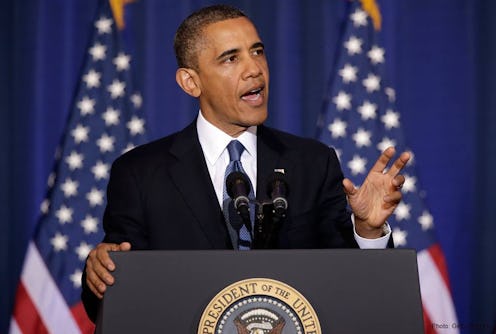News
What You Need To Know About Obama's Syria Speech

In a prime-time speech to the nation Tuesday night, President Obama held firm in his commitment to eliminate the Syrian government’s capacity to use chemical weapons but back-burnered plans to launch a military strike in hopes that the international community (which basically means Russia and the U.S.) might reach a diplomatic solution.
“If we fail to act, the Assad regime will see no reason to stop using chemical weapons,” Obama said. “As the ban against these weapons erodes, other tyrants will have no reason to think twice about acquiring poison gas and using them. Over time, our troops would again face the prospect of chemical warfare on the battlefield, and it could be easier for terrorist organizations to obtain these weapons and to use them to attack civilians.”
That, according to the president, is why “it is in the national security interests of the United States to respond to the Assad regime’s use of chemical weapons through a targeted military strike.”
Administration officials had spent the last two weeks aggressively lobbying reluctant legislators to approve a strike, and the president was intending to use today’s speech to convince the nation that war in Syria was necessary (the nation certainly does need convincing — a poll released yesterday showed that most people would oppose strikes even if Congress did approve them).
On Monday, Secretary of State John Kerry accidentally paved the way for a diplomatic solution, suggesting that a strike would be called off if the Syrian regime surrendered its chemical weapons arsenal. When Syria and Russia — Syria’s main protector — unexpectedly jumped on the offer, the U.S. began scrambling to shift gears from “war” back to “diplomacy.”
“[O]ver the last few days, we’ve seen some encouraging signs, in part because of the credible threat of U.S. military action, as well as constructive talks that I had with President Putin,” Obama said Tuesday night.
“The Russian government has indicated a willingness to join with the international community in pushing Assad to give up his chemical weapons. The Assad regime has now admitted that it has these weapons, and even said they’d join the Chemical Weapons Convention, which prohibits their use.”
The president announced that, in light of these developments, he’s requested that Congress postpone a vote on the war resolution, ordered Kerry to meet with Russia’s foreign minister later this week, and spoken to UK and French leaders about a possible UN Security Council resolution that would ban Assad from possessing chemical weapons.
“We’ll also give UN inspectors the opportunity to report their findings about what happened on August 21st,” Obama said, “and we will continue to rally support from allies from Europe to the Americas, from Asia to the Middle East, who agree on the need for action.”
Meanwhile, the U.S. military will “maintain their current posture to keep the pressure on Assad and to be in a position to respond if diplomacy fails.”
A diplomatic solution sounds great, no doubt, but there’s one problem: Putin is insisting that the U.S. take military strikes off the table before any negotiations take place, yet American officials insist that the only reason a negotiation is even on the table is because of the “credible threat” of military action. In addition, Russia has blocked any condemnation of Assad at past Security Council meetings, so the prospects of a UN resolution going anywhere seem sketchy at best.
Still, the entire two-year-old conflict was turned on its head by Kerry’s comments Monday. Anyone who tells you they know how this whole thing will end is lying to you.